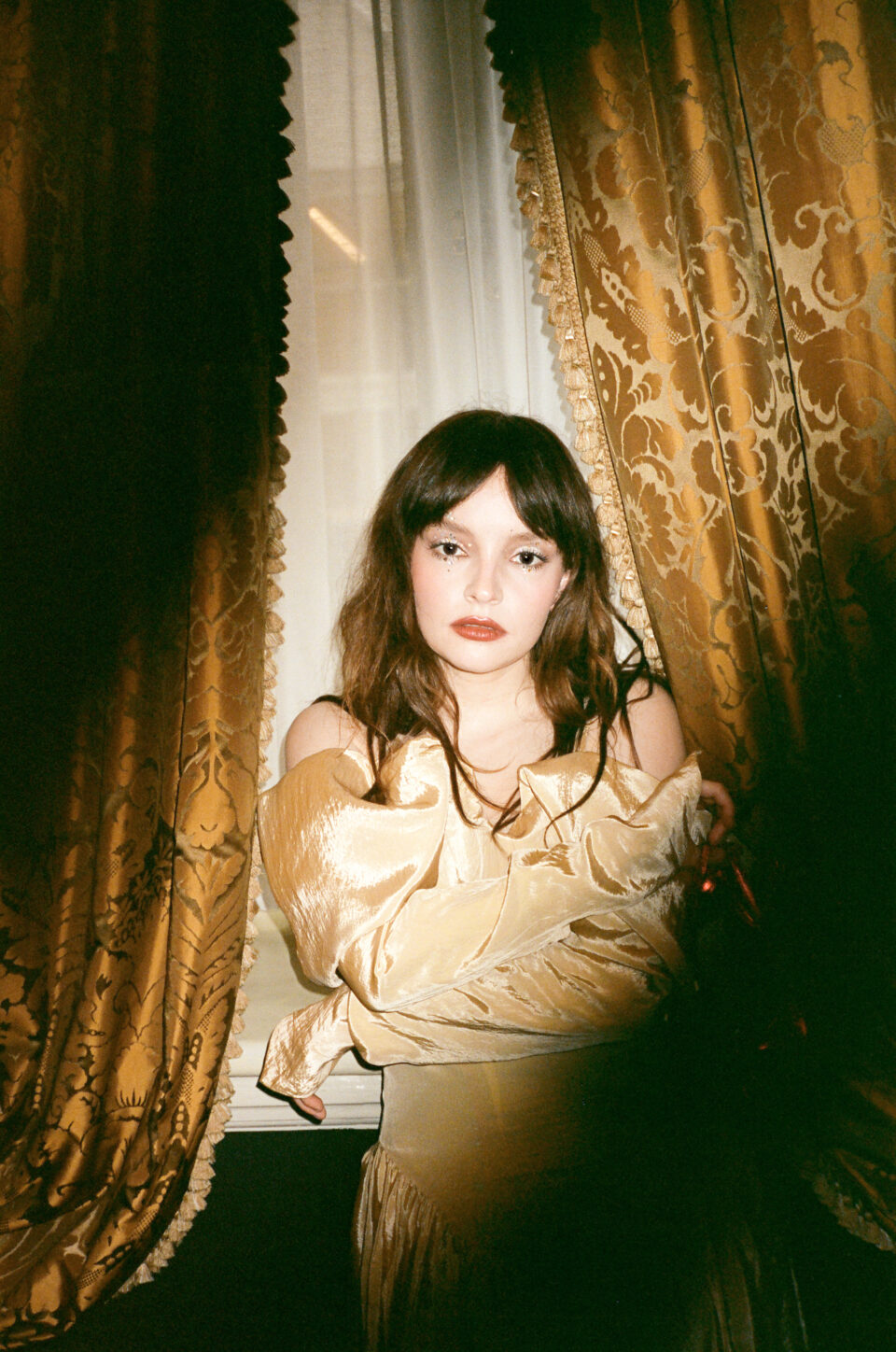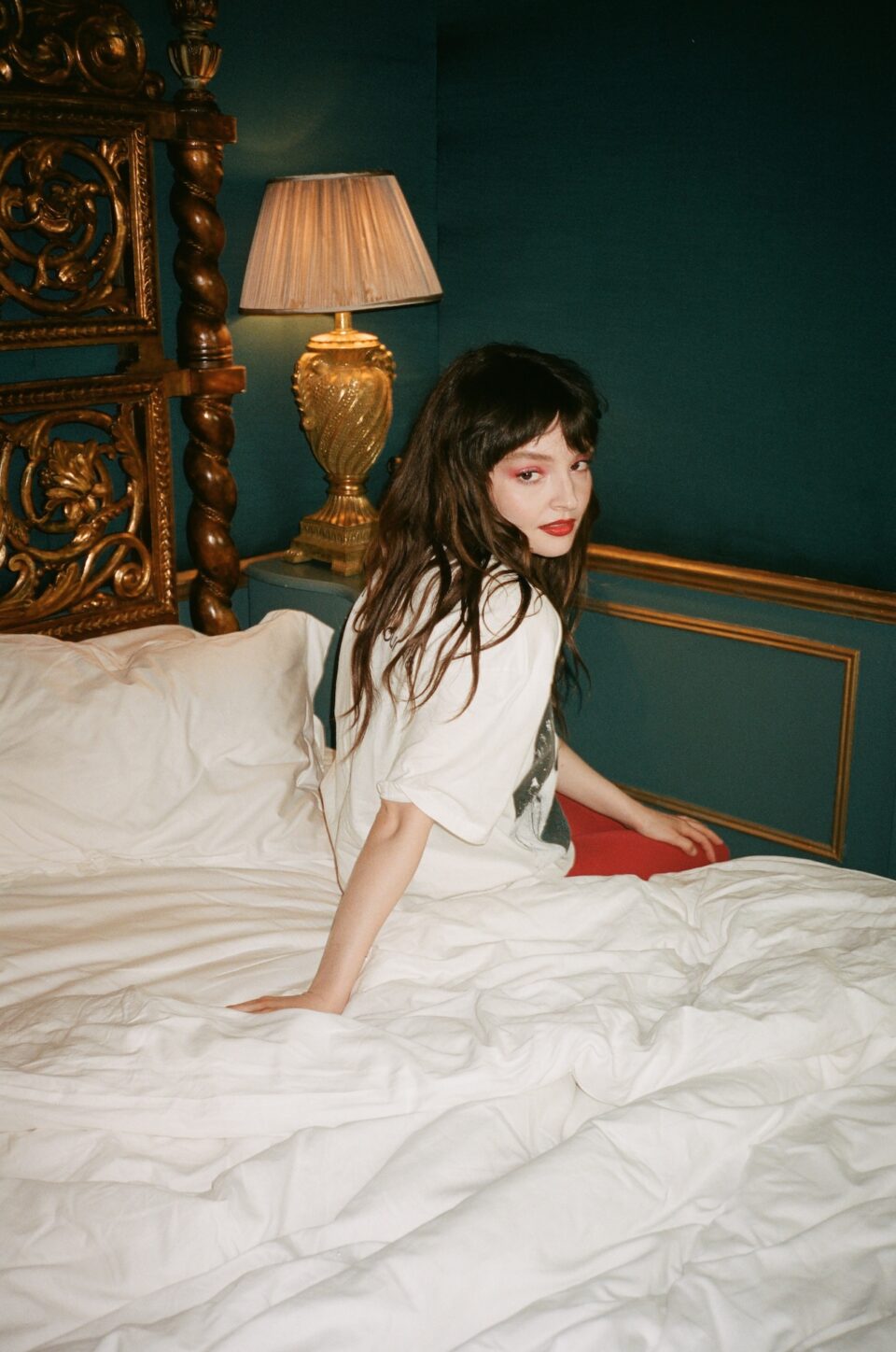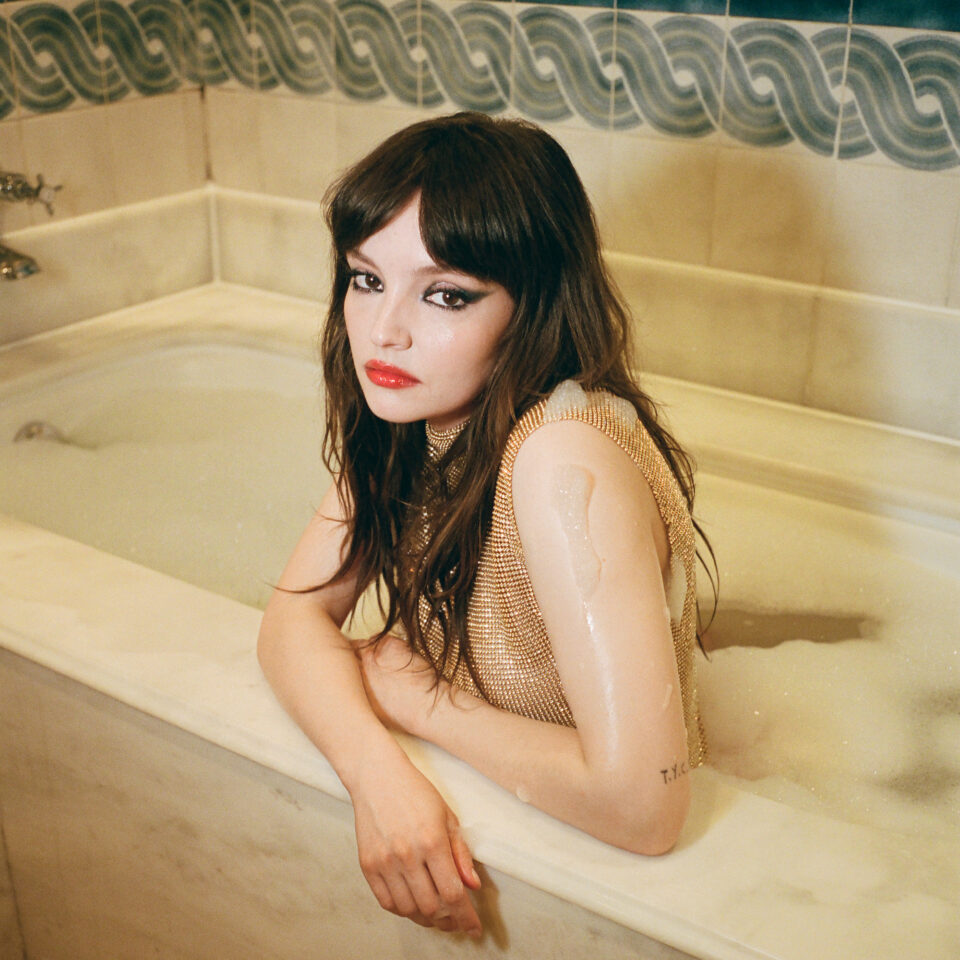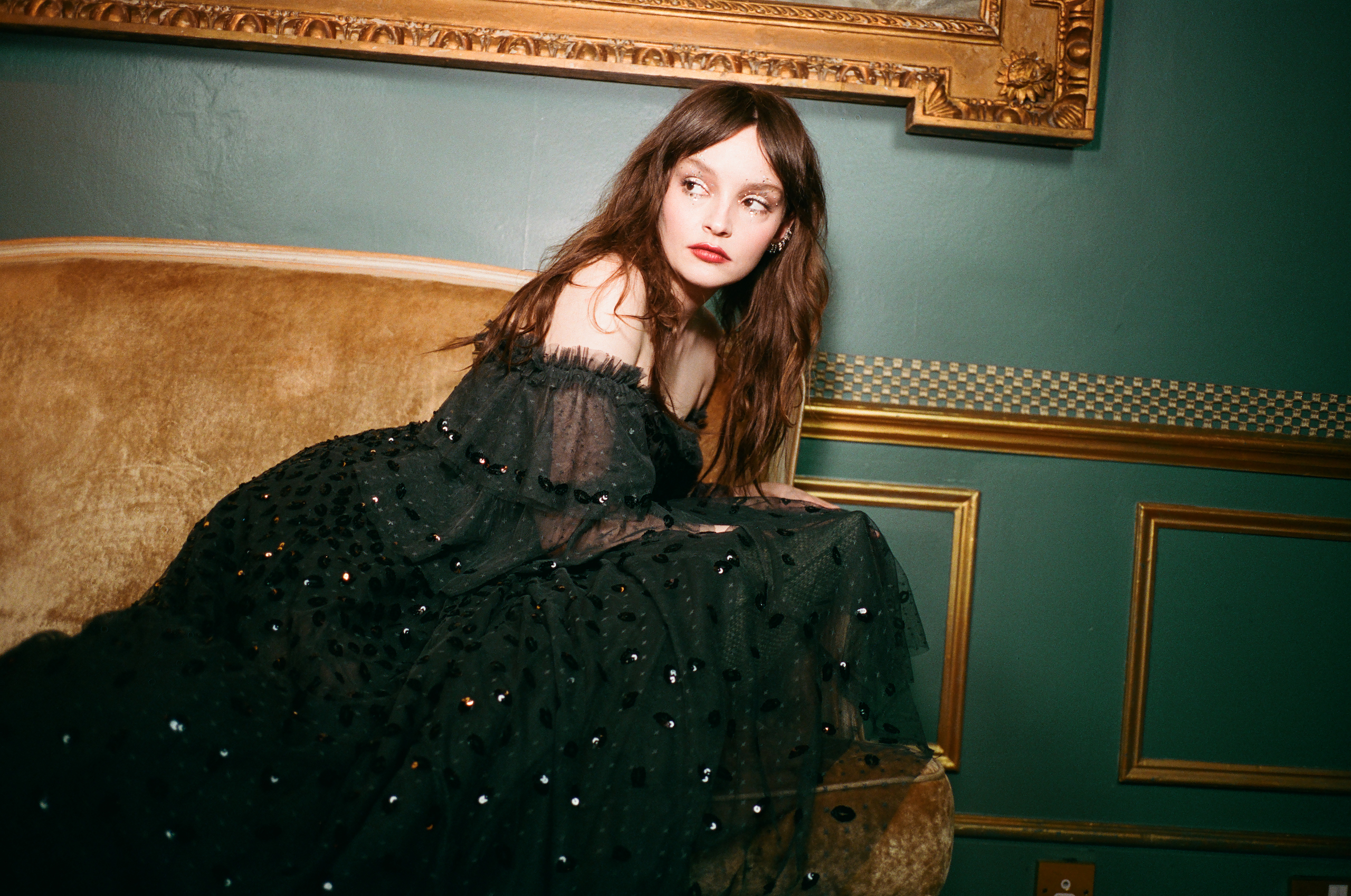When Lauren Mayberry was touring the world in support of CHVRCHES’s 2021 album Screen Violence, she began to be pulled by an unexpected force. After a decade-plus as a member of a band, she wanted to try her hand at putting out solo music. She began to think of it as a challenge: assemble an EP and see what happens. As it turned out, she loved the process of creating her own songs. CHVRCHES remained (and remains) near to her heart, but the politics of sharing your career with other people can grow complicated no matter how smoothly things go over the course of a band’s run.
That experiment became Vicious Creature, a stunning album equally indebted to Mayberry’s experiences as a woman—both within the music industry and on this planet—and her desire to build narratives and worlds in a way she was never able to with CHVRCHES. There’s a theatricality to the album, the idea of Mayberry presenting the tale of the titular creature, but within it there are also intensely realistic narratives of navigating a misogynistic world as someone who refuses to take shit from anyone. The album is about Mayberry’s growth, a direct result of moving into adulthood in the public spotlight and how taxing that can be.
Because Vicious Creature began as a test for Mayberry, a push she gave herself to experience life as a solo artist, the metrics of what “success” means has shifted. “It sounds weird to say you’re happy for yourself, but I’m happy for myself,” she tells me. The joy comes in the practice, in the beauty of creating a thing she can call entirely her own.
With the album out now via EMI, check out our conversation with Mayberry about her new solo venture below.
When did you begin to realize that you had the bones of a solo album on your hands?
When CHVRCHES was touring the last record [2021’s Screen Violence] is when I started thinking that I wanted to take a little break from that and do my own thing for a bit. It seems odd to come up with that plan whilst you’re touring a record, but being in a band, time passes in a weird way. I look at my twenties into my early thirties and I feel like that was probably four years [laughs]. It was like 12 years, but every two to two and a half years we make a record, we tour the record, we make a record, we tour the record—and I woke up and I was like, “Holy shit, all this time has passed and I’ve always thought in the back of my mind that I’d like to try something different at some point.”
During that tour I realized I wanted to make an EP, force myself to put it out, almost to prove to myself that I could. My friend once said to me, “You’re the most fearful, fearless person I’ve met.” I saw that. I always push myself over the edge at the end, but I’ll worry about it for years in the run-up to it. I decided in advance that I’ll set myself this task, but I didn’t know what it would sound like, who I was going to make it with, what the fuck I was going to do. Setting a creative brief was quite good for me, a mission statement or whatever: “I’ll at least make an EP, and now I have to go figure out what that actually is.”
What was it about solo music that you weren’t able to satisfy in a band setting?
I don’t want to speak for the guys, but I think there’s a huge amount of compromise involved in being in any communal creative project, and that’s what makes it special in so many ways. When I joined CHVRCHES, Iain [Cook] and Martin [Doherty] had already been in the band for about six months, so there was already a set way of working, a pre-existing power structure. Obviously, that went really well for us, and we’ve made so many records I’m really proud of. When I think about songwriting, it’s always lyrics-first. Whenever I write anything, it always comes from a lyric or a concept. With CHVRCHES, the lyrics always go last. It’s a fun puzzle to try and fit. The guys built this landscape, and now I have to tell a story inside this landscape. I just wondered what it would be like to write without that for the first time in a long time. Now, it’s more about the lyrics and the narrative and having the freedom to lead with that.

Did the themes begin to emerge all at once?
It was a lot more piecemeal. I think I started writing it in February, March of 2022. We’d been working with my friend Matt Koma on some CHVRCHES music. We had a really fun time writing and had a really nice dynamic. He was the first person I went to when I wanted to do some music on my own. It was really helpful for me to have the two things happening at once. We would be going on CHVRCHES tours, and during the time off I’d come home and write, and then I’d take the demos on the tour with me and I’d listen to ’em and I’d think about them. It made being in CHVRCHES healthier. I felt less isolated or lonely, because I had this outlet to think about at the same time.
Is it nerve-wracking to dedicate all your energy to a project that’s entirely yours?
This is the most peaceful I’ve felt in a long time, because I feel like all the work I could possibly do on it is done. When I was trying to figure out how to finish the record it was a much different headspace than this. I’m relatively zen, because there’s nothing I can do now. All I can do is chat to people like yourself and make my fucking TikToks [laughs].
Talk to me about the title. When did you realize that it encompassed something more than just a part of one song?
For a while I wanted to call the record a work of fiction, and I was really keen on that. I bounced it off a couple of people and they were like, “Well, if it’s your first solo record, people want to feel like it’s honest, they want to feel like it’s fact.” I was hurt about that, so I was like, “Oh, I’ll make it a song title instead.” Then the actual album title ended up coming from that song.
“[Working on solo material] made being in CHVRCHES healthier. I felt less isolated or lonely, because I had this outlet to think about at the same time.”

I liked the imagery of it, the drama of it, the idea of “Lauren Mayberry” being a vicious creature. I like the theatricality and the darkness of that. It does cover a lot of the more feminist themes on the record, I suppose. The wickedness of women is something that’s weaponized quite a lot, and it’s something that I’ve spent a lot of time with. I’ve eaten a lot of shit in a way that a lot of people don’t know about. I don’t know if it’s my personality or a gendered thing. I always feel like it’s my job to keep the peace. It’s my job to make sure things go well and nobody gets let down and nobody feels bad. I do a lot of taking care of everybody else, and if I don’t do that, then people get disturbed. I should probably go to therapy about that.
You’re the one who ends up getting blamed for that, too, if you aren’t keeping everything together, even though the stakes are unfair in the first place.
Yes. The last couple of years have been a bit of an experiment of stopping that, micromanaging things, taking my hands off the wheel. What happens? Does somebody else take over? It was a bit of a wake-up call. It really clarified a lot of relationships and dynamics for me. I also like that that’s one half of the record, and then the other half is all the hyper-emotional stuff. That’s what the actual lyric is, that nostalgia is such a vicious creature. I’ll hold on to the past like a dog—I want to be loyal, I want to be there for everybody. Sometimes I think that that’s been to the detriment of my own interests, my own health.
Does it work the other way, too? Are you someone who’s not quick to forget?
That’s something that’s definitely changed in the last few years. I used to be really quick to forgive because, with the most hurtful things that have happened to me, I’d never want to believe anybody could do that on purpose. I was always like, “Oh no, it’s fine, don’t worry about it.” And then you dive head first back in for more of the same. Certain things got to a point where I was like, “Alright, you need to grow up a bit.” It’s not cynical or unkind to recognize patterns of behavior and change your plans accordingly. That doesn’t make you an asshole. It doesn’t make you a bitch to remove yourself from situations that aren’t good for you.
So much of the narrative around my work and my career has been about feminism. People were simultaneously trying to discredit my role in the creative process because of my gender, but then also think that I must be a really bossy, powerful, angry bitch. People were saying so much about me and I was just a 25-year-old girl minding my own business. Now, I’m learning to not take shit in the same way. Maybe I’ll get it in the next decade. Maybe I’ll find the happy medium where you can firmly but fairly and with kindness not take shit.

Where do some of the sonic influences for the album come from?
The record feels like it has a lot of different influences coming from different places. It showcases a lot of who I am in a way that doesn’t necessarily exist in the band. I hope it feels honest and joyful. Even with the sadder songs on the record, there’s a freedom in being able to be that honest about things that are joyful.
Let’s say you have all the resources you have now to make a record, but you’re 25 again. Would you be able to make this record, or do you think you were only able to make your solo debut at this point in your life?
If I’d done it earlier, I would’ve been more easily led in terms of other people’s tastes. I think the great thing about CHVRCHES is that we have such a strong sonic DNA. I know what people want from us. I think it’d be terrifying to me to be signed as young as I was signed with CHVRCHES and be a solo artist. There was a safety in a communal unit that there wouldn’t be, necessarily, as an individual. I even think about not very helpful A&R notes that CHVRCHES has had at certain points. We were still swayed by those, even though we were a band of adults. If I’d been by myself at 25 and somebody had come to me and said, “This is what you should do,” it would’ve been more confusing for me. Whereas now, I think I know roughly what I wanted. I want to make something that feels more theatrical and dramatic and character-driven and vivid than CHVRCHES albums. That’s what half the album ended up being, and then the other half was chronicling the life stuff that happened as I was writing.
I don’t know if “happiness” sums it up too neatly, but it seems like you’re very comfortable with the place you’re at as an artist and as a person right now.
I would say so, yeah. Six months ago I was stressed out trying to finish this album. It sounds weird to say you’re happy for yourself, but I’m happy for myself. Three years ago, I didn’t feel like I had a huge number of creative options. I hope that there are many more pages in the CHVRCHES story, but you don’t know. Bands don’t last forever. Bands are really complicated and they’re really political and they’re really fucking messy. That’s what makes them wonderful. I got to a point, though, where I was like, “Oh, if this went away tomorrow, I haven’t really gone to bat for myself in terms of my own creative life.”
Ultimately we started making music because it was something we felt like we had to do. It wasn’t because we were trying to get paid, or because it was a business. It was because we really wanted to create. I had kind of boxed myself in in a way that wasn’t helpful or healthy for me. Now, I’m happy no matter what happens with the record, no matter what happens with the band. I’ve future-proofed myself in terms of being a creator. That’s something I feel like I owe to my 23-year-old self. FL







